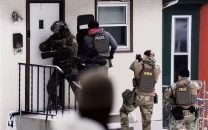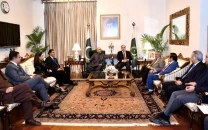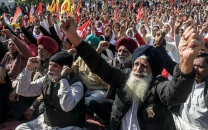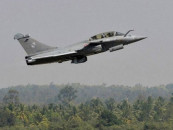Uncertainty in Afghanistan endangers Pakistan
Prolonged Afghanistan conflict will give space, fuel to terrorist & insurgent waging anti-systemic fight in Pakistan.

The writer is an adjunct scholar at the Middle East Institute in Washington, DC and president of Vizier Consulting, LLC. He tweets @arifcrafiq
We, too, have difficulty reading — reading the future of Afghanistan and, by extension, Pakistan. Part of the uncertainty lies in the “data” that is available. For example, we really won’t know how many Afghan soldiers, police and local militiamen will desert in the months leading up to the end of US combat operations in 2014. According to Isaf, there is “no viable method of validating personnel numbers” offered by the Afghan government. Data provided by local commanders is often written by hand or embellished.
The broader landscape is also fuzzy. The Taliban have opened an office in Doha, implicitly gaining some international legitimacy. And at the same time, they have opened a deadly summer offensive in Kabul. June 25’s show of strength in the most secure area of the Afghan capital doesn’t necessarily mean that the Taliban are averse to peace — but they are clearly keen on continuing the fight.
Peace itself remains elusive. There’s neither a framework nor much incentive to scale down the conflict as the US reduces its footprint in Afghanistan and a leadership transition takes place in Kabul. Why would the Taliban lay down their arms when they don’t know who will be president of Afghanistan within a year from now? With whom exactly would the Taliban make a deal with in Afghanistan? An exiting Karzai, derided by all?
Ultimately, the Taliban will have to make an agreement with other Afghans to avert a civil war. But it will be difficult to attain some kind of intra-Afghan accord in an election season. Elections tend to be divisive affairs that reify sociopolitical cleavages. The departure of Western forces means the loss of that connective tissue (or cash) that has brought some of Afghanistan’s warring factions together post-9/11. Behind the scenes, the Bonn framework could be unravelling. Abdur Rashid Dostum, the anti-Taliban ethnic Uzbek warlord, has been reportedly trying to bolster his militia in anticipation of renewed civil strife. And more publicly, there was an assassination attempt on Muhammad Mohaqiq, the Hazara Shia leader, earlier this month.
A further prolonged conflict in Afghanistan does not serve Pakistan’s interests. It will give space to and fuel terrorist and insurgent forces that are waging an anti-systemic fight in Pakistan. Though centre-right and Islamist politicians in Pakistan are keen on talks with militants in Fata, al Qaeda and the Tehreek-e-Taliban Pakistan (TTP) are prepping for a war that continues in Pakistan if and once the American war on terror in neighbouring Afghanistan comes to an end. Leading takfiri jihadist leaders, including al Qaeda’s Ahmed Farooq, have reached out to Baloch insurgents, asking them to join their ranks in an Islamic framework. Another pro-TTP preacher has not only done the same, but has also justified the targeting of mosques with suicide blasts. The longer this war goes on in Afghanistan, the deeper this cancer of takfiri jihadism will spread into Pakistan’s bones.
The dormant US-Afghan Taliban dialogue was revived this month in large part due to the efforts of the Pakistani civilian and military leadership. It is a last-minute effort to push for a political settlement before it’s too late. It might already be too late. Still, Islamabad must renew outreach to non-Pashtun political forces in Afghanistan, including all major 2014 presidential candidates. The goal should be to convince Afghanistan’s major power brokers that Pakistan’s civil and military leadership seeks peace and stability for its neighbour and could offer moral support for an intra-Afghan dialogue that would include the Taliban. For its own selfish reasons, Pakistan needs to mitigate the risks of intra-Afghan strife as a political and military transition takes place in Afghanistan. If it fails to do so, it might long for the days America ruled Afghanistan.
Published in The Express Tribune, June 27th, 2013.
Like Opinion & Editorial on Facebook, follow @ETOpEd on Twitter to receive all updates on all our daily pieces.



















COMMENTS
Comments are moderated and generally will be posted if they are on-topic and not abusive.
For more information, please see our Comments FAQ